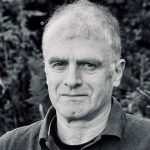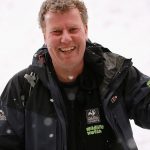Steering Group

New Networks for Nature was run by a steering group - the final members of the group were:
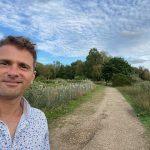 Nick Acheson lives in a flint cottage by a duckpond beside the River Wensum in North Norfolk. He grew up nearby, beside the River Stiffkey. In the process of moving three miles between North Norfolk rivers, he spent ten years in South America (largely by the Rivers Piraí, Iténez and Mamoré in Bolivia), four in India (along the Brahmaputra, among many others) and worked with wildlife on every continent. Having reflected deeply on climate, biodiversity and ecotourism, he has given up flying. He now cycles around North Norfolk, and walks along the Wensum; and writes, speaks, teaches and presents on wildlife and conservation, often on behalf of Norfolk Wildlife Trust, Pensthorpe Conservation Trust and Felbeck Trust.
Nick Acheson lives in a flint cottage by a duckpond beside the River Wensum in North Norfolk. He grew up nearby, beside the River Stiffkey. In the process of moving three miles between North Norfolk rivers, he spent ten years in South America (largely by the Rivers Piraí, Iténez and Mamoré in Bolivia), four in India (along the Brahmaputra, among many others) and worked with wildlife on every continent. Having reflected deeply on climate, biodiversity and ecotourism, he has given up flying. He now cycles around North Norfolk, and walks along the Wensum; and writes, speaks, teaches and presents on wildlife and conservation, often on behalf of Norfolk Wildlife Trust, Pensthorpe Conservation Trust and Felbeck Trust.
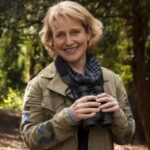 Amy-Jane Beer is a biologist, writer and editor based in North Yorkshire. She earned a PhD studying the nervous systems of sea urchins before realising that her vocation lay in communicating science rather than doing it - something she has now done for 20 years. She was editor of Wildlife of Britain and Animals Animals Animals magazines, and currently edits Wildlife World magazine for the People's Trust for Endangered species. She has written numerous reference books on science and nature for all ages and edits scientific manuscripts for researchers for whom English is a second or third language. She is a regular contributor to BBC Wildlife magazine and a Country Diarist for the Guardian. In 2018 she ran a campaign to supply Robert Macfarlane and Jackie Morris's powerful nature book, The Lost Words to every primary school in North and East Yorkshire. She is a judge on the BTO Bird Photographer of the Year competition and is writing her first novel, Heartwood. She is co-organiser of the 2019 Nature Matters symposium.
Amy-Jane Beer is a biologist, writer and editor based in North Yorkshire. She earned a PhD studying the nervous systems of sea urchins before realising that her vocation lay in communicating science rather than doing it - something she has now done for 20 years. She was editor of Wildlife of Britain and Animals Animals Animals magazines, and currently edits Wildlife World magazine for the People's Trust for Endangered species. She has written numerous reference books on science and nature for all ages and edits scientific manuscripts for researchers for whom English is a second or third language. She is a regular contributor to BBC Wildlife magazine and a Country Diarist for the Guardian. In 2018 she ran a campaign to supply Robert Macfarlane and Jackie Morris's powerful nature book, The Lost Words to every primary school in North and East Yorkshire. She is a judge on the BTO Bird Photographer of the Year competition and is writing her first novel, Heartwood. She is co-organiser of the 2019 Nature Matters symposium.
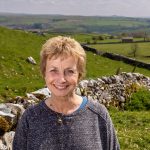 Mary Colwell is an award-winning author, producer and campaigner for nature. Her articles have appeared in the Guardian, BBC Wildlife Magazine, The Tablet, Country Life and many other publications. She has made documentaries for the BBC Natural History Unit in both TV and radio, and has published three books: John Muir – the Scotsman Who Saved America’s Wild Places, Curlew Moon and Beak Tooth and Claw, also published by William Collins, in April 2021. Her fourth book, The Gathering Place, will be published by Bloomsbury in 2023. In 2009 she won a Sony Radio Academy Gold award and in October 2017 she was awarded the Dilys Breese Medal by the BTO for outstanding science communication, in 2018, the David Bellamy Award from the Gamekeepers Association for her conservation work on curlews and in 2019, the WWT Marsh Award for Conservation. She spearheaded the establishment of a GCSE in Natural History. In March 2021 she was appointed Chair of the government supported Curlew Recovery Partnership England, a roundtable of organisations charged with restoring curlews, their habitats and associated wildlife across England. In 2020 she set up the charity, Curlew Action.
Mary Colwell is an award-winning author, producer and campaigner for nature. Her articles have appeared in the Guardian, BBC Wildlife Magazine, The Tablet, Country Life and many other publications. She has made documentaries for the BBC Natural History Unit in both TV and radio, and has published three books: John Muir – the Scotsman Who Saved America’s Wild Places, Curlew Moon and Beak Tooth and Claw, also published by William Collins, in April 2021. Her fourth book, The Gathering Place, will be published by Bloomsbury in 2023. In 2009 she won a Sony Radio Academy Gold award and in October 2017 she was awarded the Dilys Breese Medal by the BTO for outstanding science communication, in 2018, the David Bellamy Award from the Gamekeepers Association for her conservation work on curlews and in 2019, the WWT Marsh Award for Conservation. She spearheaded the establishment of a GCSE in Natural History. In March 2021 she was appointed Chair of the government supported Curlew Recovery Partnership England, a roundtable of organisations charged with restoring curlews, their habitats and associated wildlife across England. In 2020 she set up the charity, Curlew Action.John Fanshawe is an author, curator and environmentalist based in north Cornwall. Over the last 35 years, he has worked on bird and biodiversity conservation in the UK, Kenya and Tanzania, primarily for the charity BirdLife. With Terry Stevenson, he is co-author of field guide, Birds of East Africa (2001, 2021), and with Nigel Redman and Terry Stevenson of Birds of the Horn of Africa (2009, 2016). With Mark Cocker, he edited and published the complete works of the author J. A. Baker, including The Peregrine, in 2010. He has an MA in Art and Environment from University College Falmouth and, since 2016, has been Curator of the Arts, Science and Conservation Programme (ASCP), for the Cambridge Conservation Initiative (CCI).
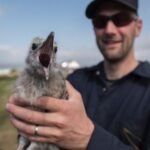 Ben Hoare is Features Editor of BBC Wildlife Magazine, which luckily also happens to be his dream job. He joined the prestigious Bristol-based magazine in 2008, after 12 years as a freelance natural-history book editor and author, and stints volunteering for the RSPB and BirdLife International. One of his books, Animal Migration: Remarkable Journeys in the Wild, was published by the Natural History Museum in 2009. He is a well-travelled birder and has finally achieved his ambition to see the world's smallest bird, the delightful bee hummingbird. In 2015, he was awarded the British Trust for Ornithology's Dilys Breese Medal. One day, he will write an award-winning book about nature, but until then he is happy editing other people’s words.
Ben Hoare is Features Editor of BBC Wildlife Magazine, which luckily also happens to be his dream job. He joined the prestigious Bristol-based magazine in 2008, after 12 years as a freelance natural-history book editor and author, and stints volunteering for the RSPB and BirdLife International. One of his books, Animal Migration: Remarkable Journeys in the Wild, was published by the Natural History Museum in 2009. He is a well-travelled birder and has finally achieved his ambition to see the world's smallest bird, the delightful bee hummingbird. In 2015, he was awarded the British Trust for Ornithology's Dilys Breese Medal. One day, he will write an award-winning book about nature, but until then he is happy editing other people’s words.
www.discoverwildlife.com
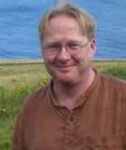 Richard Kerridge is a nature writer and ecocritic. Cold Blood: Adventures with Reptiles and Amphibians, published by Chatto & Windus in 2014, is a mixture of memoir and nature writing. Richard’s work has been broadcast on BBC Radio 4 and published in BBC Wildlife, Poetry Review and Granta. He was awarded the 2012 Roger Deakin Prize by the Society of Authors, and has twice received the BBC Wildlife Award for Nature Writing. Richard leads the MA in Creative Writing at Bath Spa University, and has published numerous essays giving environmental readings of literature. He was co-editor of Writing the Environment, the first collection of ecocritical essays to be published in Britain, and a leading member of the team of creative writers and scientists led by SueEllen Campbell that wrote The Face of the Earth: Natural Landscapes, Science and Culture.
Richard Kerridge is a nature writer and ecocritic. Cold Blood: Adventures with Reptiles and Amphibians, published by Chatto & Windus in 2014, is a mixture of memoir and nature writing. Richard’s work has been broadcast on BBC Radio 4 and published in BBC Wildlife, Poetry Review and Granta. He was awarded the 2012 Roger Deakin Prize by the Society of Authors, and has twice received the BBC Wildlife Award for Nature Writing. Richard leads the MA in Creative Writing at Bath Spa University, and has published numerous essays giving environmental readings of literature. He was co-editor of Writing the Environment, the first collection of ecocritical essays to be published in Britain, and a leading member of the team of creative writers and scientists led by SueEllen Campbell that wrote The Face of the Earth: Natural Landscapes, Science and Culture.
Jamie Normington enjoys most things. He lives between the Lake District and Yorkshire Dales National Parks in an undesignated sliver of land that few people visit yet most of the wildlife lives. He has taught, learned and shared for over two decades in five countries to date and particularly enjoys introducing people to new ideas, friends and possibilities.
From childhood TV extra to accidental film role, his face recently found a happy home on BBC radio. A former columnist for Brighton’s Argus and Nowa Trybuna Opolska, Jamie has worked for Cumbria Wildlife Trust for longer than anywhere else, and now focuses on bringing local wildlife conservation and people together.
(Photo credit: Terry Abraham)
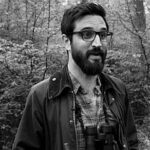 Michael J. Warren is an ecocritic, writer and medievalist, specialising in historical human-nonhuman relationships. He is author of Birds in Medieval English Poetry and honorary research fellow at Birkbeck College, University of London, where he works on birds/nature in Old English place-names. Michael is also co-series editor of the peer-reviewed journal Medieval Ecocriticisms, for which he produced the first issue. Michael’s nature writing has appeared in EarthLines and The Curlew. He is currently writing a book on birds in our sense of place.
Michael J. Warren is an ecocritic, writer and medievalist, specialising in historical human-nonhuman relationships. He is author of Birds in Medieval English Poetry and honorary research fellow at Birkbeck College, University of London, where he works on birds/nature in Old English place-names. Michael is also co-series editor of the peer-reviewed journal Medieval Ecocriticisms, for which he produced the first issue. Michael’s nature writing has appeared in EarthLines and The Curlew. He is currently writing a book on birds in our sense of place.
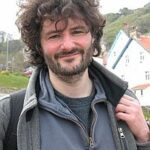
Philip Warren has been an academic in ecology at the University of Sheffield for over 30 years, a more or less direct consequence of discovering, at an early age, the delights of pond dipping. He has taught on a range of ecological topics including freshwater biology, landscape ecology and environmental data analysis. His research has focused on understanding the diversity and functioning of ecological communities and the effects of human activities on them, with particular emphasis on urban and freshwater ecosystems. Having worked on a number of interdisciplinary research projects, he is particularly interested in how insights from different disciplines contribute the way we understand nature and address environmental issues
PAST STEERING GROUP MEMBERS
Mark Cocker (2009–2013); Paul Jepson (2009–2012); Rob Lambert (2011–2014); Stephen Moss (2011–2015); John Barlow (2011–2016); Rosamond Richardson (2016–2017) Derek Niemann (2015-2018) Gill Tew (2015-2017); Carry Ackroyd (2010-2017); Jonathan Elphick (2013-2017); Kate Risley (2014-2017), Jeremy Mynott (2009-2018), Mike Toms (2009-2019), Tim Birkhead (to 2021), Matt Howard (to 2021), Harriet Mead (to 2022), Laurence Rose (to 2022).

